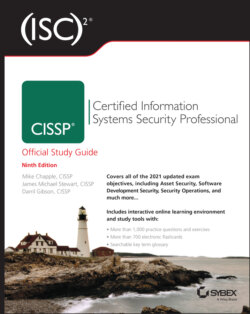Читать книгу (ISC)2 CISSP Certified Information Systems Security Professional Official Study Guide - Mike Chapple - Страница 34
Integrity
ОглавлениеIntegrity is the concept of protecting the reliability and correctness of data. Integrity protection prevents unauthorized alterations of data. Properly implemented integrity protection provides a means for authorized changes while protecting against intended and malicious unauthorized activities (such as viruses and intrusions) as well as mistakes made by authorized users (such as accidents or oversights).
Integrity can be examined from three perspectives:
Preventing unauthorized subjects from making modifications
Preventing authorized subjects from making unauthorized modifications, such as mistakes
Maintaining the internal and external consistency of objects so that their data is a correct and true reflection of the real world and any relationship with any other object is valid, consistent, and verifiable
For integrity to be maintained on a system, controls must be in place to restrict access to data, objects, and resources. Maintaining and validating object integrity across storage, transport, and processing requires numerous variations of controls and oversight.
Numerous attacks focus on the violation of integrity. These include viruses, logic bombs, unauthorized access, errors in coding and applications, malicious modification, intentional replacement, and system backdoors.
Human error, oversight, or ineptitude accounts for many instances of unauthorized alteration of sensitive information. They can also occur because of an oversight in a security policy or a misconfigured security control.
Numerous countermeasures can ensure integrity against possible threats. These include strict access control, rigorous authentication procedures, intrusion detection systems, object/data encryption, hash verifications (see Chapter 6, “Cryptography and Symmetric Key Algorithms,” and Chapter 7, “PKI and Cryptographic Applications”), interface restrictions, input/function checks, and extensive personnel training.
Confidentiality and integrity depend on each other. Without object integrity (in other words, the inability of an object to be modified without permission), confidentiality cannot be maintained.
Integrity is dependent on confidentiality and access control. Concepts, conditions, and aspects of integrity include the following:
Accuracy: Being correct and precise
Truthfulness: Being a true reflection of reality
Validity: Being factually or logically sound
Accountability: Being responsible or obligated for actions and results
Responsibility: Being in charge or having control over something or someone
Completeness: Having all necessary components or parts
Comprehensiveness: Being complete in scope; the full inclusion of all needed elements
